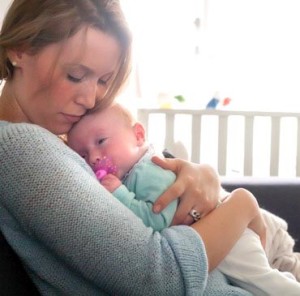 Whenever I talk about the symptoms of perinatal mood and anxiety disorders, I always include “unusual physical symptoms.” What does that mean? It means that any new physical symptoms that begin during pregnancy and postpartum can be related to mental health.
Whenever I talk about the symptoms of perinatal mood and anxiety disorders, I always include “unusual physical symptoms.” What does that mean? It means that any new physical symptoms that begin during pregnancy and postpartum can be related to mental health.
My own experience with postpartum depression and anxiety was quite atypical, and that was partly why I suffered for months before receiving the proper diagnosis and treatment.
I had lots of risk factors for postpartum depression: a previous bout of depression, the sudden loss of my mother only a few years before, a previous birth trauma, an unsupportive marriage, and breastfeeding difficulties. But even though I had suffered from depression before, after the death of my mother, my postpartum symptoms were not recognizable to me.
I did OK after my first child was born, although it was a difficult time for me. But after my second child, my stress level was off the charts. My older son was kicked out of two day care programs because he wouldn’t use the potty (he regressed after his brother was born). I never made enough milk for the new baby because of my stress level and because he was so big (born almost 10lbs) , and he refused to nurse completely as soon as he started solid foods. I felt guilty about “failing” at breastfeeding, and I was also afraid that I would not be able to go back to work after maternity leave because I couldn’t find daycare that would take my challenging and potty-resistant older son.
In the meantime, I had difficulties in my marriage. My husband worked long hours, and when he was there he criticized my parenting style, my cooking, and my housekeeping. Even our challenging preschooler was my fault! I was trying my best to make everyone happy, but I was clearly failing.
During this time, I started to have odd physical symptoms. I started feeling that the room was tilting and that I was off-balance. I had to lie down and felt the room was spinning around me. My doctor thought it was either an inner-ear infection or possibly Multiple Sclerosis, and I was sent for neurological testing. The tests came back normal, although MS couldn’t be ruled out (a bonus for my anxiety, of course!).
My symptoms came and went, and then began to include nausea and vomiting along with the dizziness, a complete lack of appetite, and an inability to sleep. I had a low-grade fever on and off for a couple of months and my white blood-cell count was high. I lost 16 pounds beyond the baby weight, slept about three to four hours a night, and threw up regularly — out the door of the car, in the sink at the pediatrician’s office, etc. I felt that my body was swaying even when I was perfectly still, and my bed felt like it was shaking as I lay in it trying to sleep. My skin felt prickly, my chest burned and my hands tingled. The dizziness made watching TV or reading impossible, and walking or driving became difficult. I felt sure that I was dying.
My doctor considered an inner ear problem, hormones, diabetes, thyroid issues, and even encephalitis, but every test came back normal. I was living on Ensure and Gatorade, because I couldn’t keep any solid food down. The stress of caring for my children became unbearable, so we hired a babysitter and I spent most of every day lying in bed, praying to fall asleep for a couple of hours to get some rest. I was prescribed Ativan, but it just knocked me out for an hour or two and I would wake up feeling even worse than before.
After about four months, I fell apart completely and told my doctor that he had to hospitalize me because I was dying, and at that point I wanted to die if they couldn’t stop the misery I was living in. I was admitted to a psychiatric inpatient unit, but my doctor was still sending me around to specialists, trying to figure out what was physically wrong with me.
I stopped vomiting as soon as I was admitted to the hospital. That was when I realized that whatever was going on with me had to do with stress. I spent 12 days in the hospital, during which time I started taking antidepressants and was prescribed an anti-anxiety medication that allowed me to sleep. For a few days, all I did was sleep. When I was awake I was no longer nauseous, but I was filled with unbearable emotional pain. I was terrified that I would never be able to care for my children without getting sick. I felt like the worst mother in the world.
After I was released from the hospital I did a full-day partial hospitalization program for a month, which gave me time for the antidepressant to start working and allowed me to take care of myself for a change. I learned in group therapy about the ways in which I had prioritized my responsibility for others way above self-care, in unhealthy and unhelpful ways, and I began to heal. With the help of medication, therapy, and later couples counseling, I recovered. I still had anxiety at times, but I also had joy and passion for life. I became a lactation educator, started a small business helping other new moms, and led new parent support groups for several years. Eight years later I went back to school to become a Marriage and Family Therapist.
I still have to be vigilant about managing stress and maintaining good self-care. I tell myself that this is the “gift” of being prone to depression and anxiety: I don’t have the luxury of tolerating a great deal of stress like some people seem to do, or living life in a way that generally makes me unhappy. I am obligated to do work that I love, to have a healthy relationship with my husband, and to prioritize joy, peace and comfort as well as caring for my family. I know that I always have to be mindful to avoid a recurrence of depression, but I also know that I am strong and resilient and will do whatever I have to do to be healthy and take good care of myself and my children.
My mental health issues began when my second child was seven months old, and yet no one ever considered a postpartum condition. My symptoms were fully consistent with panic disorder and depression, and yet my doctor and my therapist (yes, a trained therapist!) never considered these diagnoses. My hope is that in the future, mothers and their caregivers become better educated to recognize perinatal mood and anxiety disorders so that they can be treated early and mothers can return to enjoying their lives again.
- If you need immediate help, please call the National Suicide Hotline at 1-800-273-TALK (8255)
- If you are looking for pregnancy or postpartum support and local resources, please call or email Postpartum Support International:
Call PSI Warmline (English & Spanish) 1-800-944-4PPD (4773)
Email support@postpartum.net
Take a test to see if you have Prenatal or Postpartum Depression

 What is it exactly that makes a committed relationship work, after kids come into the picture? It’s maintaining a loving and safe connection that allows new parents to weather the storms of raising kids with their relationship intact.
What is it exactly that makes a committed relationship work, after kids come into the picture? It’s maintaining a loving and safe connection that allows new parents to weather the storms of raising kids with their relationship intact.
 On Wednesday, I was invited to speak to a group of local doulas, the
On Wednesday, I was invited to speak to a group of local doulas, the  People have a physiological reaction to the sound of a baby crying. Our hearts pound, our blood pressure rises, and we start to sweat. This reaction causes most of us to try to stop the crying, regardless of how tired, irritable, or hungry we might be ourselves. And that’s a good thing. It’s how our babies learn to trust that their needs will be met and that the world is a safe place.
People have a physiological reaction to the sound of a baby crying. Our hearts pound, our blood pressure rises, and we start to sweat. This reaction causes most of us to try to stop the crying, regardless of how tired, irritable, or hungry we might be ourselves. And that’s a good thing. It’s how our babies learn to trust that their needs will be met and that the world is a safe place.